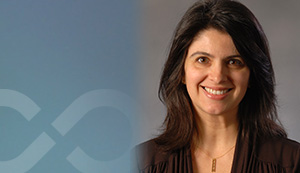Chiorean exploring targeted therapies in GI cancers

Those who follow the trends in modern cancer research know we have entered a new era of discovery. The old strategy of indiscriminately attacking the body to rid it of cancerous cells is giving way to more targeted approaches to treating disease.
E. Gabriela Chiorean, MD, associate professor of medicine at the University of Washington School of Medicine and recipient of the 2014 Danny Danielson Translational Innovation Award, has been steadily gathering tumor samples and blood through clinical studies she has conducted. Biospecimens such as these, collected from consenting patients, are crucial for investigators to learn more about the biomarkers that fuel the development of specific cancers.
Correlative studies built around these biospecimens can help scientists learn why some patients respond to treatment while others do not, and in turn, better predict which patients will be good candidates for specific therapies.
Chiorean says the $10,000 Danielson Award will be an important catalyst for future research in pancreatic and colorectal cancer using the samples she has collected.
“Sometimes you receive an award for work you already conducted,” she said. “But this is an award for something that needs to come. So, I feel a responsibility to do the right kind of trials, to put this to good use.”
The Danny Danielson Translational Innovation Award was created in 2013 by Donald C. “Danny” Danielson and is granted twice each year through the Walther Cancer Foundation to investigators working in partnership with Hoosier Cancer Research Network. The award supports the correlative components of clinical trial protocols when financial support is not otherwise available.
Chiorean’s research interests have centered on signaling pathways in colon, rectal, pancreatic, and biliary tumors, particularly pathways related to the epidermal growth factor receptor (EGFR). Other areas of interest include developing more effective therapies that target the tumor stroma and DNA repair pathways in tumors, as well as research to better identify areas within GI cancers in which immunotherapeutics may be most relevant.
Born in Sebes, Romania, Chiorean originally planned to pursue a career in astronomy and nuclear physics. But watching her mother struggle with multiple sclerosis led her to the universe within the human body.
“Her sickness made me want to be a physician,” said Chiorean. “I came to appreciate that everything you can do for someone who is ill is so important to their everyday life.”
Chiorean earned her bachelor of medicine (MD) degree from the University of Medicine and Pharmacy Cluj-Napoca, Romania. She then moved to the United States, where she conducted laboratory research in hematology at the University of Michigan and an internal medicine residency at William Beaumont Hospital in Royal Oak, Mich. During her residency, she found her niche working with cancer patients.
“They could smile and laugh, knowing they have three months to live,” recalls Chiorean. “It made me realize these are my role models, and this is worth putting my career into — helping these cancer patients survive another day.”
Chiorean completed her fellowship in hematology-oncology at the University of Minnesota in 2002 and joined the university’s faculty as assistant professor in the Department of Medicine, Division of Hematology-Oncology-Transplantation.
In 2004, Chiorean moved to the Indiana University School of Medicine where she served as assistant professor in the Division of Hematology-Oncology. As a researcher at the Indiana University Melvin and Bren Simon Cancer Center, Chiorean served as medical director of the GI Oncology and Phase I programs, and as co-director of the multi-disciplinary Pancreatic Cancer Clinic.
During this time, she was introduced by Drs. Larry Einhorn, Pat Loehrer, and the late Steve Williams, to clinical research opportunities available through Hoosier Cancer Research Network, known then as Hoosier Oncology Group (HOG).
“The HOG became the way of connecting to clinical trials,” she said. “It’s like you became part of a family, of a team, that had the best reputation and a very astute leadership in organizing clinical trial research.”
Chiorean became active with HCRN, serving as co-chair of the Gastrointestinal Clinical Trial Working Group since 2005 and as a member of the Scientific Oversight Committee since 2010. She was the principal investigator and lead or co-author on three HCRN studies, including:
- GI03-53: A Phase II Trial of Preoperative Capecitabine Plus Irinotecan Followed by Combined Modality Capecitabine and Radiation for Locally Advanced Rectal Cancer
- GI06-101: Phase II Trial of Erlotinib in Combination With Docetaxel in Advanced Hepatocellular and Biliary Tract Carcinomas
- GI05-102: Phase I / Randomized Phase II Study of Second Line Therapy With Irinotecan and Cetuximab With or Without RAD001, an Oral mTOR Inhibitor for Patients With Metastatic Colorectal Cancer
In 2012, Chiorean moved to the University of Washington, Seattle, where she is associate professor of medicine, and an associate member in the Clinical Research Division at the Fred Hutchinson Cancer Center.
The university’s membership status with HCRN allows Chiorean to remain engaged with the network.
“I am really happy that I continue to be a part of HCRN,” she said. “I have so many amazing collaborators and an organization that is really so supportive of research.”
About Hoosier Cancer Research Network:
Hoosier Cancer Research Network (formerly known as Hoosier Oncology Group) conducts innovative cancer research in collaboration with academic and community physicians and scientists across the United States. The organization provides comprehensive clinical trial management and support, from conception through publication. Created in 1984 as a program of the Walther Cancer Institute, Hoosier Cancer Research Network became an independent nonprofit clinical research organization in 2007. Since its founding, Hoosier Cancer Research Network has initiated more than 150 trials in a variety of cancer types and supportive care, resulting in more than 300 publications. More than 4,600 subjects have participated in Hoosier Cancer Research Network clinical trials.

Facebook
Hoosier Cancer Research Network on Facebook
Linked In
You Tube
Twitter